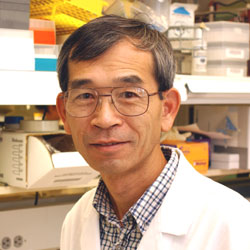| |
| |
| Kuo-Ping Huang, Ph.D., Senior Investigator |
 |
Dr. Huang received his B.S. degree from National Taiwan University in 1964. He received his Ph.D. degree in 1970 from the University of California, Davis, where he studied fatty acid metabolism with Paul K. Stumpf. Dr. Huang did postdoctoral training with Enrico Cabib at the NIDDK on the regulation of glycogen metabolism by protein phosphorylation. In 1973 he moved to NICHD as a Senior Staff Fellow and became Chief of the Section on Metabolic Regulation in 1984. Dr. Huang received the NIH Director's Award in 1988 for his work on the roles of protein kinase C isoforms in cellular regulation. His laboratory is studying the role of protein kinase C and its target in learning and memory using genetically altered mutant mice.
|

|
Staff:
- Fuyuki Mitsuyama, M.D., Guest Researcher, (301) 496-9906 mitsuyaf@mail.nih.gov
- Catherine Boucheron, Ph.D., Postdoctoral Fellow, (301) 496-1093 catherib@mail.nih.gov
- Dr. Freesia L Huang, Ph.D., Staff Scientist, (301) 496-1093 fhuang@helix.nih.gov
- Pavan D. Shetty, Ph.D., Postdoctoral Fellow, (301) 496-9906 shettyp@mail.nih.gov
Research Interests:
Background: Neurogranin/RC3 (Ng) is one of the most prominent PKC substrates concentrated in the post-synaptic terminals. It is also sensitive to modifications by oxidants, such as nitric oxide and hydrogen peroxide, to generate intramolecular disulfide bonds and/or glutathiolation. Both the phosphorylated and intramolecular disulfide forms of Ng have lower affinities for CaM as compared to that of the unmodified form. By virtue of its ability to bind CaM and to regulate the intracellular levels of calcium and CaM, Ng has been implicated in the regulation of many signal transduction pathways utilizing calcium, cAMP, and NO as second messengers. To investigate the role of Ng in neural function, we have generated a strain of knockout (KO) mice. The mutant mice develop normally without any obvious anatomical abnormality; however, they exhibit severe deficits in learning the spatial tasks. Analysis of the learning behaviors of the heterozygous and wild type mice revealed that the abilities of mice to learn the spatial tasks are positively correlated to their hippocampal Ng contents. The mutant mice also exhibit deficits in the induction and maintenance of long-term potentiation (LTP). The biochemical basis of these deficits appears to be related, in part, to the defective mechanism for the activation of CaMKII.
Ongoing research: Use Ng KO mice to study the regulatory roles of Ng in postsynaptic signal transduction pathways underlying neuronal plasticity, and learning and memory. Currently, we are investigating the neurotransmitter- and LTP-induced phosphorylation and upregulation of the various signaling components relevant to synaptic plasticity in both the wild type and KO mice. Cognitive functions of the mutant mice are being tested with several behavioral testing protocols to better understand the extent of deficits in the KO mice. We are also making attempt to generate transgenic mice to remedy the deficits of these KO mice.
|
Selected Recent Publications:
Shetty PK, Huang FL, Huang KP. (2008) Ischemia-elicited oxidative modulation of Ca2+/calmodulin-dependent protein kinase II., J Biol Chem.
Full Text/Abstract
Huang KP, Huang FL, Shetty PK, Yergey AL. (2007) Modification of protein by disulfide S-monoxide and disulfide S-dioxide: distinctive effects on PKC., Biochemistry 46(7), 1961-71.
Full Text/Abstract
Huang FL, Huang KP, Boucheron C. (2007) Long-term enrichment enhances the cognitive behavior of the aging neurogranin null mice without affecting their hippocampal LTP., Learn Mem 14(8), 512-9.
Full Text/Abstract
Huang FL, Huang KP, Wu J, Boucheron C. (2006) Environmental enrichment enhances neurogranin expression and hippocampal learning and memory but fails to rescue the impairments of neurogranin null mutant mice, J Neurosci 26(23), 6230-7.
Full Text/Abstract
Huang KP, Huang FL, Jager T, Li J, Reymann KG, Balschun D. (2004) Neurogranin/RC3 enhances long-term potentiation and learning by promoting calcium-mediated signaling., J Neurosci 24(47), 10660-9.
Full Text/Abstract
Wu J, Huang KP, Huang FL. (2003) Participation of NMDA-mediated phosphorylation and oxidation of neurogranin in the regulation of Ca2+- and Ca2+/calmodulin-dependent neuronal signaling in the hippocampus., J Neurochem 86(6), 1524-33.
Full Text/Abstract
Watson JB, Khorasani H, Persson A, Huang KP, Huang FL, O'Dell TJ. (2002) Age-related deficits in long-term potentiation are insensitive to hydrogen peroxide: coincidence with enhanced autophosphorylation of Ca2+/calmodulin-dependent protein kinase II, J Neurosci Res 70(3), 298-308.
Full Text/Abstract
All Selected Publications
Contact Information:
Dr. Kuo-Ping Huang
Metabolic Regulation Section
Endocrinology and Reproduction Research Branch, NICHD
Building 49, Room 6A36
49 Convent Drive MSC 4510
Bethesda, MD 20892-4510
Telephone: (301) 496-7827 (office),
(301) 496-9906 (laboratory),
(301) 496-7434 (fax)
Email: huangk@mail.nih.gov
|
|















